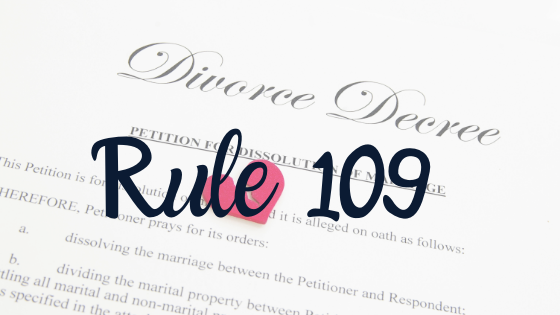Legal matters can be difficult to deal with, especially with family law cases. Emotions run high and parties may feel anger or resentment toward each other. As a result, they may behave in a way that will hurt the other party – especially in divorce cases.
To protect both parties in family law cases such as divorce, annulment, custody, paternity, and other cases involving custody or parent time, the state approved a new rule, which went into effect on January 1, 2020. In many family law cases, the court enters an injunction (a court order) immediately following the filing of the initial Petition.
What is Rule 109?
Rule 109 is part of the Utah Rules of Civil Procedure, which applies to domestic relations cases. Unlike other procedural rules, which are generally the rules of practice and procedures for going to court, Rule 109 is a court order and applies to the parties. It governs the behavior of both parties from the outset of the case and identifies specific things that neither party may do.
Have you ever asked yourself or your lawyer “can I do this or that” or “is it legal for my spouse to . . .”? Before rule 109, the answers to these questions weren’t always clear. Before doing anything, you may want to read through Rule 109 very carefully, as a violation could result in consequences such as having to pay fines. The rule is effective when the petitioner files the case and when the respondent sends an answer.
You don’t want to start your case by breaking a court order. The rule covers behaviors involving general information, property, and children, which include:
General and property provisions of Rule 109:
- Don’t sell, transfer, hide, throw away, or damage your spouse’s property or other joint/marital property.
- Don’t harass or intimidate your spouse, this includes through electronic means.
- Don’t cancel your spouse’s cell phone or shut off the utilities or other similar services.
- Don’t remove your spouse or children from health insurance, car insurance, life insurance, or the like.
- Don’t open a line of credit in your spouse’s name or use your spouse’s name to obtain a service.
- Don’t change the beneficiary to remove your spouse from an account.
- Don’t stop paying insurance premiums or allow a policy to lapse.
Provisions regarding children:
- Don’t take or move out of state with the children or engage in “non-routine travel” without written consent from your spouse.
- If you travel with the children, make sure your spouse knows where you are going, when you will return and can contact the children if needed
- Don’t try and influence a child’s preference for custody or parent-time.
- Don’t speak negatively of your spouse to the children.
- Don’t involve your children in legal matters.
Why is it needed?
Rule 109 a “common sense” rule and includes really basic stuff. Why would a rule like this be needed? Surprisingly, in many divorce and custody cases, people often do these things. It causes more harm than good. This rule acts as a reminder to act responsibly and protects both parties and any minor children who are involved.
What if parties or spouses consent or agree to sell property or change services?
Parties are free to consent to do things as they see fit, including many of the things that are prohibited in the court order. If you and your spouse agree to sell property, cancel accounts, change phone plans, etc.., it is always best to get this agreement in writing. The rule repeatedly references written consent. Get something in writing to protect yourself.
Modifying and terminating the Rule
While Rule 109 is automatically included in the types of cases mentioned above, it can be modified with the court’s approval. A party may request to have the rule modified which will be done “as expeditiously as possible” if the court determines it is necessary.
The rule is terminated once a final decree has been entered by the court or the parties agree otherwise in writing, or if the Petition is dismissed.
If you need help with a family law case or any other legal matter, our firm has the expertise you need. Call us at 801-544-5306 or send us a message to set up a free consultation. We’ve had over 30 years of experience with family law in Utah and know how to help you.








Leave A Comment